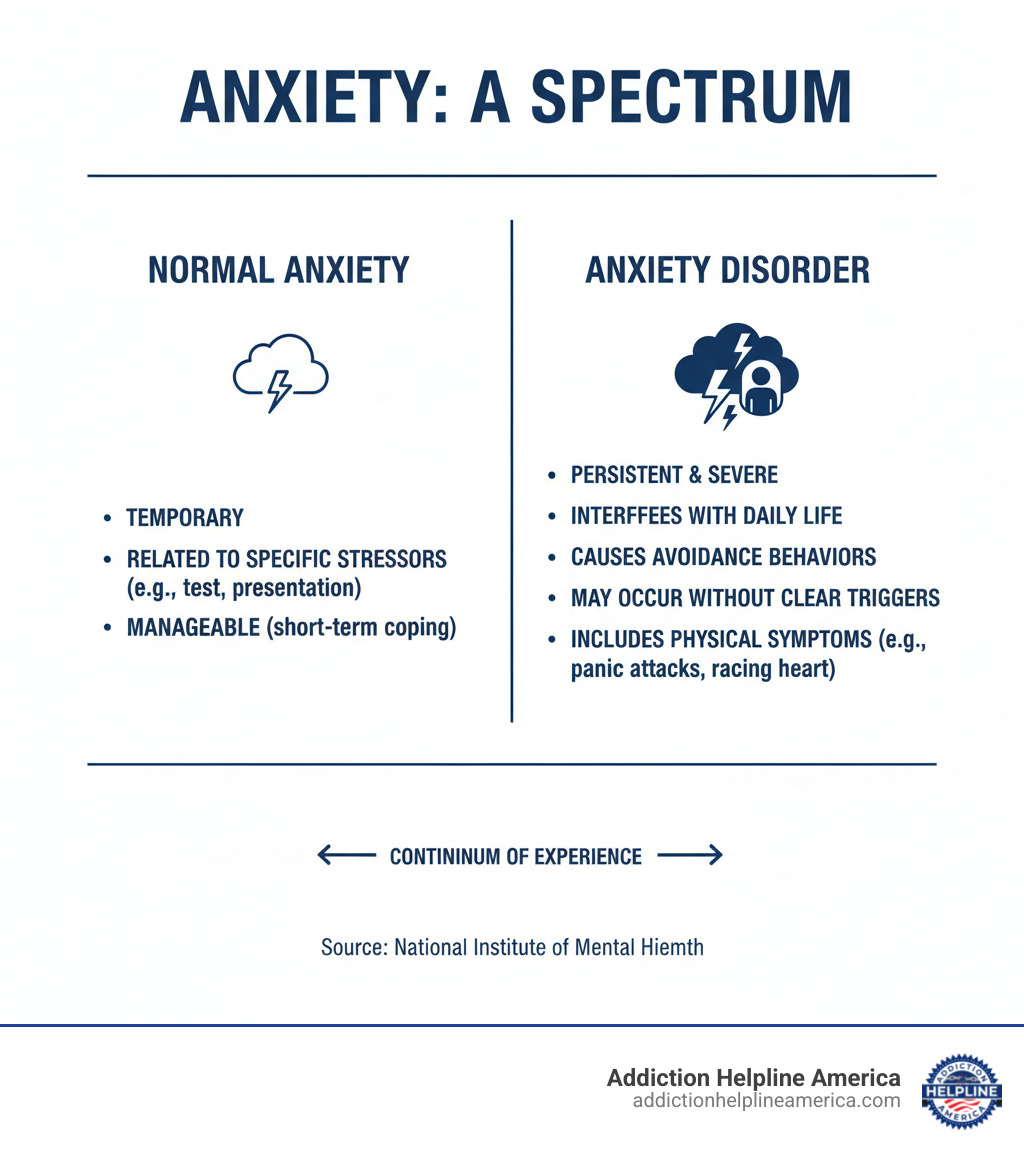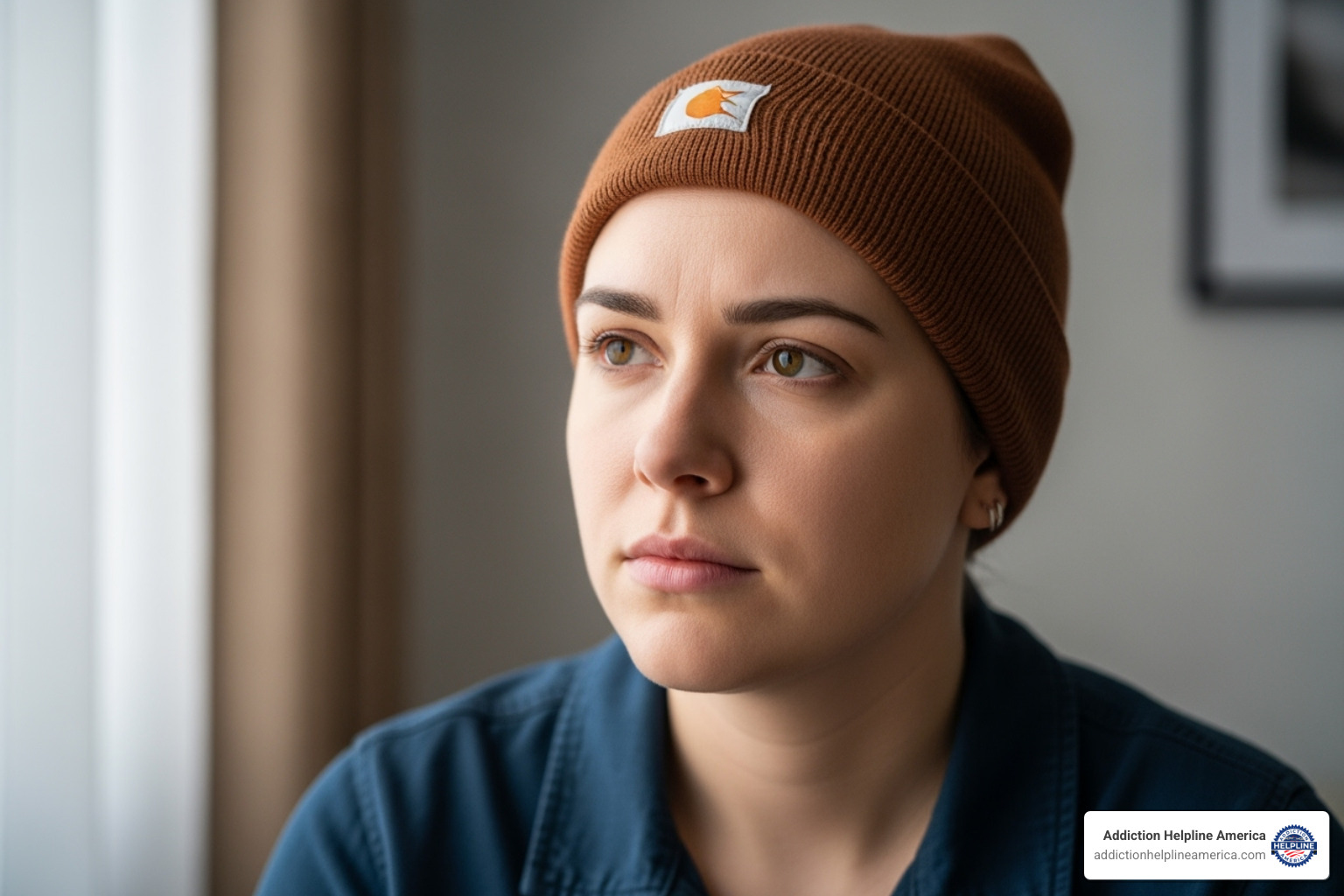
Understanding Anxiety and Finding Help in Tulsa
Anxiety treatment Tulsa offers multiple pathways to recovery for individuals struggling with excessive worry, fear, and stress. If you’re looking for help in Tulsa, here are your primary options:
- Therapists and Counselors: Licensed professionals (LPC, LCSW, LMFT) offering CBT, EMDR, DBT, and exposure therapy.
- Psychiatrists and Psychiatric Nurse Practitioners: Medical providers who can prescribe medication and offer therapy.
- Treatment Centers: Facilities offering intensive outpatient programs and specialized, evidence-based care.
- Insurance Coverage: Most major providers (BlueCross BlueShield, Aetna, UnitedHealthcare, Cigna) cover mental health services.
Anxiety is incredibly common, affecting over 40 million American adults each year. While everyone feels anxious sometimes—it’s a natural response to stress—it becomes a problem when it disrupts your daily life, keeps you from doing things you enjoy, or causes physical symptoms like chest pain or nausea.
The good news is that anxiety is highly treatable. Tulsa offers a wide range of professional resources, from individual therapists to comprehensive care facilities. Treatment can help you learn coping skills, challenge negative thought patterns, and regain control of your life.
At Addiction Helpline America, we’ve helped countless individuals find recovery from mental health challenges like anxiety disorders. We connect people in Tulsa with compassionate, evidence-based anxiety treatment Tulsa providers. This article will guide you through understanding anxiety, knowing when to seek help, and exploring the treatment options available in Tulsa.
Understanding Anxiety: Common Symptoms and Disorders
Anxiety is your body’s natural alarm system. It’s useful when you need to stay alert, but for millions, this alarm gets stuck in the “on” position. When anxiety becomes a constant presence, it can feel like fear, worry, and dread are controlling your life. For some, it can even lead to terrifying panic attacks, where your heart races and you feel a sense of doom, even when you’re safe.
What are the different types of anxiety disorders?
Anxiety disorders come in different forms, and anxiety treatment Tulsa providers are skilled at addressing each type.
- Generalized Anxiety Disorder (GAD): Characterized by persistent and excessive worry about various aspects of life, such as health, work, or relationships, making daily activities feel overwhelming.
- Social Anxiety Disorder: An intense fear of being judged or humiliated in social situations. It’s more than shyness and can make interactions at work or parties feel terrifying.
- Panic Disorder: Involves sudden, intense panic attacks that can feel like a heart attack. The fear of having another attack can become a constant source of stress.
- Agoraphobia: An intense fear of being in places where escape might be difficult, like crowded stores or public transportation. It often develops after panic attacks and can lead to being homebound.
- Specific Phobias: An irrational fear of a particular object or situation, such as heights, flying, or spiders. The fear is disproportionate to the actual danger.
- Separation Anxiety Disorder: Not just for children, this involves overwhelming anxiety when separated from loved ones, driven by a fear that something bad will happen to them.
Understanding your specific type of anxiety is the first step toward finding the right treatment. For more information on mental health services, you can explore Oklahoma mental health services.
What are the common symptoms that indicate a need for treatment?
It’s time to seek professional help when anxiety disrupts your life, work, and relationships. Key signs include:
- Emotional Symptoms: Constant restlessness, irritability, a mind racing with uncontrollable worries, or a persistent sense of dread.
- Physical Symptoms: A racing heartbeat, excessive sweating, nausea, muscle tension, headaches, and insomnia. Many also experience shortness of breath, trembling, or dizziness.
- Cognitive Symptoms: Difficulty concentrating as your mind jumps from one worry to another, making it hard to complete tasks.
If these symptoms are persistent, cause you significant distress, and lead you to avoid daily activities, it’s a clear sign that it’s time to seek help. Anxiety treatment Tulsa professionals can help you manage these symptoms and regain your peace of mind.
When to Seek Professional Anxiety Treatment in Tulsa
Normal anxiety is temporary and often motivating. But when it becomes a constant, shadowing presence, it’s time to consider professional help. Many people downplay their feelings, but when anxiety starts running your life, reaching out for support is a sign of strength.
Clear signals that you need help include daily life disruption, where worry prevents you from doing routine things like grocery shopping or driving. Work interference is another red flag, such as calling in sick, struggling to concentrate, or feeling paralyzed by decisions. Anxiety can also cause relationship strain by making you withdraw emotionally or cancel plans, leading to isolation.
When does anxiety cross the line into a disorder?
The line between stress and a disorder is crossed when anxiety becomes a clinical condition. This is when anxiety treatment Tulsa professionals can provide essential support. Key indicators include:
- Persistent and severe anxiety: This isn’t just a few days of worry. It’s anxiety that lasts for months and shows up day after day.
- Affects daily functioning: You struggle to get out of bed, complete basic tasks, or maintain responsibilities at home or work.
- Hinders work or school: It may manifest as missed deadlines, difficulty focusing, or avoiding important events like presentations.
- Avoidance behaviors: You start reorganizing your life to avoid triggers, which shrinks your world and lets anxiety take control.
- Anxiety without a clear trigger: You experience a racing heart or a sense of dread for no apparent reason, which can feel particularly unsettling.
What are the benefits of seeking professional help for anxiety?
Reaching out for help is about taking your power back. The benefits of seeking anxiety treatment Tulsa offers are life-changing.
- Learn coping mechanisms: You’ll develop a personalized toolkit of lifelong skills to manage anxiety in the moment.
- Challenge negative thoughts: Therapy helps you recognize and replace the distorted, anxious thoughts that fuel your fear with more balanced, realistic ones.
- Gain control over your life: You’ll start to reclaim the parts of your life you’ve been avoiding, building confidence that you can manage anxiety, not the other way around.
- Reduce physical symptoms: Treatment can significantly lessen the physical toll of chronic anxiety, such as a racing heartbeat, nausea, and insomnia, helping you feel more relaxed and energetic.
- Improve relationships: By managing your anxiety, you can be more present and engaged with your loved ones.
- Regain peace of mind: Most importantly, you can experience life without constant worry. This is a realistic outcome of effective anxiety treatment.
Evidence-Based Therapy for Anxiety Relief
While medication can be helpful, therapy is an incredibly effective treatment for anxiety, often with more lasting results. At Addiction Helpline America, we connect individuals with therapists who teach them lifelong skills for managing anxiety. Unlike medication, which addresses symptoms, therapy gets to the root of the problem by helping you understand your anxiety, challenge the thoughts that fuel it, and develop healthier responses. Research from sources like the NIMH information on psychotherapy for anxiety disorders confirms that psychotherapy produces long-lasting results and can prevent future relapses.
What are the primary therapies used for anxiety treatment in Tulsa?
Anxiety treatment Tulsa providers offer several evidence-based approaches, and the right one for you will depend on your specific needs.
- Cognitive Behavioral Therapy (CBT): The gold standard for anxiety, CBT is based on the idea that your thoughts, feelings, and behaviors are connected. A therapist helps you identify and challenge unhelpful thought patterns, replacing them with more realistic ones to break the cycle of worry.
- Exposure Therapy: This therapy helps you gradually and safely confront what you fear in a controlled environment. With a therapist’s support, your brain learns that the feared situation is not as dangerous as it feels, which reduces your anxiety response over time.
- Dialectical Behavior Therapy (DBT): Highly effective for intense emotions, DBT teaches skills in four key areas: mindfulness, distress tolerance, emotion regulation, and interpersonal effectiveness. These tools help you manage emotional storms without being overwhelmed.
- Eye Movement Desensitization and Reprocessing (EMDR): Particularly effective for anxiety rooted in trauma, EMDR helps your brain process distressing memories so they no longer trigger an intense anxiety response. The memories lose their emotional charge, allowing for genuine healing.
- Mindfulness-Based Therapy: This approach teaches you to observe anxious thoughts and feelings without judgment. By staying grounded in the present moment, you change your relationship with anxiety rather than fighting it.
How effective are non-medication treatments like therapy?
Therapy works. Research consistently shows that talk therapy, especially CBT, is as effective as medication for many anxiety disorders. The skills you learn in therapy are yours forever. You learn to identify triggers, challenge catastrophic thoughts, and use healthy coping mechanisms in any situation. This not only reduces current symptoms but also builds resilience, significantly lowering the risk of relapse.
Furthermore, therapy provides a safe, non-judgmental relationship with a therapist. This therapeutic alliance is a powerful healing component in itself. Most people notice improvements within a few weeks of consistent therapy, and with effort, the changes can be life-altering. If you’re ready to explore what therapy can do for you, we can help you find help in Tulsa and take the first step toward a calmer life.
The Role of Medication and Finding the Right Provider
For many, managing anxiety involves a combination of therapy and medication. Medication is not a sign of weakness; it’s a medical treatment that can provide the stability needed to engage fully in therapy. When anxiety is so severe that it’s hard to function, medication can offer relief, allowing you to focus on learning the coping skills that lead to long-term recovery.
What is the role of medication and when is it prescribed?
Medication plays a supportive role in anxiety treatment Tulsa, especially when symptoms are severe or therapy alone isn’t enough. It’s not a standalone cure but works best as part of a comprehensive plan that includes therapy.
Medication is often prescribed for severe symptoms that impair daily functioning, such as frequent panic attacks or anxiety so intense it prevents you from working or leaving home.
- Antidepressants like SSRIs and SNRIs are highly effective for chronic anxiety. They work by balancing neurotransmitters in the brain but typically take two to four weeks to show their full effect.
- Anxiolytics such as benzodiazepines work quickly to calm intense anxiety or panic. Due to their potential for dependence, they are usually prescribed for short-term use during acute episodes.
The most effective approach is often the collaboration between medication and therapy. Medication can reduce the intensity of symptoms, making it easier to engage in therapy and practice new coping strategies. This combined approach often yields the best and most lasting results.
What should I look for in an anxiety therapist or psychiatrist in Tulsa?
Finding the right mental health professional is a personal process, and it’s okay to take time to find a good fit. The relationship you have with your provider is a key part of your recovery.
First, ensure you’re seeking a licensed professional. For therapy, look for credentials like LPC (Licensed Professional Counselor), LCSW (Licensed Clinical Social Worker), or LMFT (Licensed Marriage and Family Therapist). For medication, you’ll need a psychiatrist (MD) or a PMHNP (Psychiatric Mental Health Nurse Practitioner).
Look for a provider with specializations that match your needs, such as trauma, OCD, or social anxiety. Ask about their therapeutic approach (e.g., CBT, EMDR) to see if it aligns with what you’re looking for. A good provider will offer a client-centered approach, tailoring treatment to your unique situation.
Above all, you should feel safe and not judged. A strong therapeutic alliance, where you feel heard and understood, is one of the best predictors of successful treatment. If you don’t feel that connection, it’s okay to look for someone else.
At Addiction Helpline America, we understand how overwhelming these choices can be. We’re here to provide free, confidential guidance and connect you with the right anxiety treatment Tulsa provider for your needs.
Your Path to Recovery: What to Expect from Treatment
Starting anxiety treatment Tulsa is a courageous step. Recovery is a gradual process, not an overnight fix. It requires active participation and consistent effort, but the peace and freedom you can gain are worth it. Some days will feel like breakthroughs, while others may be challenging. This is a normal part of the journey. What matters is showing up and trusting the process.
We understand this can feel overwhelming, which is why we’re here to help you find the right support. For individuals exploring broader mental health options, you can also find other Oklahoma rehabs.
How long does therapy for anxiety typically take to show results?
The timeline for seeing results from therapy varies for each person. It depends on factors like the severity of your symptoms and how long you’ve been struggling.
- Severity of Symptoms: Someone with recent, mild anxiety might see improvement in a few weeks. For those with severe, chronic anxiety, recovery may take longer, and that’s okay.
- Therapy Duration: Short-term, goal-oriented therapies like CBT can produce significant results in 5-20 weekly sessions. Long-term support can be valuable for addressing deeper issues and building lasting resilience.
- Medication Timeline: If medication is part of your plan, antidepressants typically take 2-4 weeks to become fully effective. Fast-acting medications provide more immediate relief for acute episodes.
Therapy requires consistent effort. The real progress happens when you practice the skills you learn between sessions—challenging anxious thoughts, using coping techniques, and facing situations you’ve been avoiding. Your therapist is your coach, but you are the one who puts the learning into practice.
How can I access anxiety treatment services in Tulsa?
Accessing anxiety treatment Tulsa services is more straightforward than you might think. There are several clear pathways to get the help you need.
- Finding a Provider: Online directories can help you search for therapists and psychiatrists in Tulsa, filtering by specialty, insurance, and other preferences. You can browse profiles to get a feel for who might be a good fit.
- Using a Referral Service: This is where Addiction Helpline America can simplify your search. We offer free, confidential, and personalized guidance to connect you with the right program from our extensive network of providers, saving you time and stress.
- Checking Insurance: Most major insurance providers in Oklahoma cover mental health services. Many treatment centers will verify your benefits for you, removing a potential barrier to starting care.
- Booking an Appointment: Once you find a provider, booking is usually a simple phone call or online form away. Don’t hesitate to ask questions to ensure you feel comfortable moving forward.
- Telehealth Options: Many Tulsa providers offer virtual care through video or phone calls. This provides flexibility and privacy, allowing you to receive quality care from the comfort of your home.
If you’re exploring options in nearby areas, you can also find treatment centers in Oklahoma City to broaden your search.
Taking the first step is often the hardest part. Reaching out for help is a sign of strength, and you don’t have to do it alone.
Conclusion: Your Path to a Calmer Life Starts Today
We’ve explored the many faces of anxiety and the effective anxiety treatment Tulsa offers. From the constant worry of GAD to the terror of panic attacks, anxiety affects millions, but it is highly treatable. Recognizing when your anxiety is disrupting your life is the first step toward recovery.
Reaching out for professional help opens the door to profound change. Through evidence-based therapies like CBT, DBT, and EMDR, you can learn lifelong coping skills, challenge negative thought patterns, and regain control. For some, medication can provide essential support, creating the stability needed for therapy to be most effective.
Finding the right provider is key. Look for a licensed professional with whom you feel safe and understood. Your recovery journey is unique, and consistent effort is what leads to lasting change. Accessing care in Tulsa is easier than ever with online resources, telehealth options, and insurance coverage.
At Addiction Helpline America, we’ve guided countless individuals on this path. We know reaching out is a big step, and we’re here to make it easier. We provide free, confidential, and personalized guidance to connect you with a compassionate anxiety treatment Tulsa provider from our network. Taking this step is a powerful act of strength. You deserve a life free from the grip of anxiety, and we’re here to help you find it.
Find the right anxiety treatment program in Tulsa and start your journey today. You don’t have to do this alone.
Our helpline is 100%
free & confidential
If you or someone you care about is struggling with drug or alcohol addiction, we can help you explore your recovery options. Don’t face this challenge alone—seek support from us.
Programs
Resources
Will my insurance
cover addiction
treatment?
We're ready to help
Find the best
drug or alcohol treatment
center
Are you or a loved one struggling with addiction? Call today to speak to a treatment expert.
















